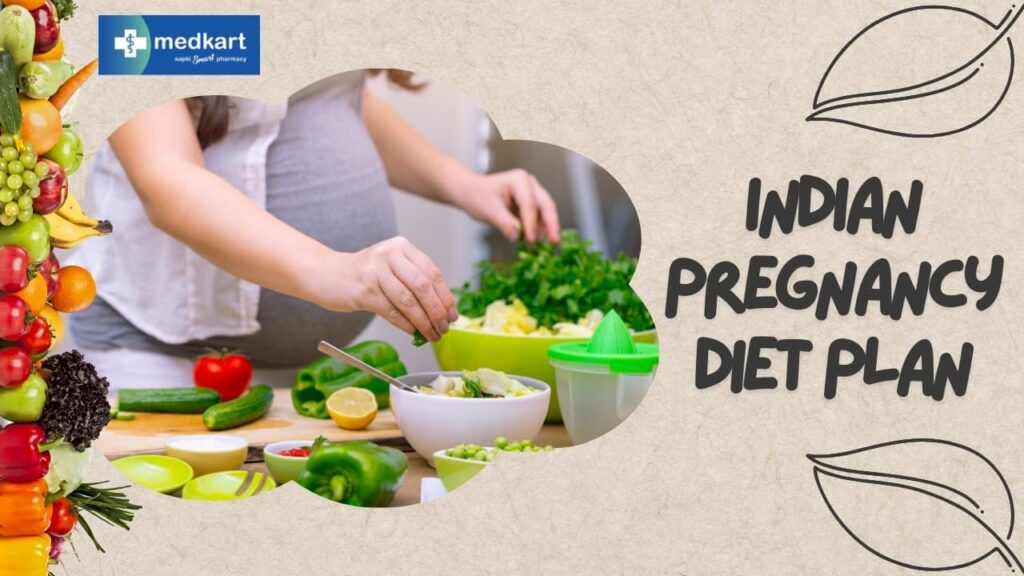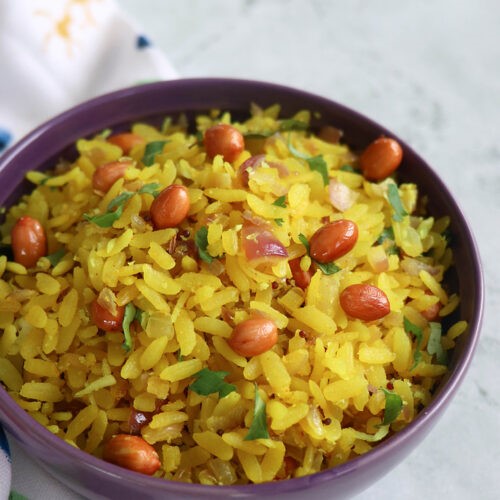Last updated on April 11th, 2025 at 01:28 pm
 Pregnancy is a magical journey filled with anticipation, excitement, and the joy of creating new life. Alongside this incredible experience comes the responsibility of nurturing both the mother and the growing baby. One of the most crucial aspects of a healthy pregnancy is maintaining a balanced diet rich in essential nutrients. In India, where food is not just sustenance but also deeply ingrained in culture and tradition, crafting a pregnancy diet plan that aligns with nutritional needs can be both fulfilling and enriching.
Pregnancy is a magical journey filled with anticipation, excitement, and the joy of creating new life. Alongside this incredible experience comes the responsibility of nurturing both the mother and the growing baby. One of the most crucial aspects of a healthy pregnancy is maintaining a balanced diet rich in essential nutrients. In India, where food is not just sustenance but also deeply ingrained in culture and tradition, crafting a pregnancy diet plan that aligns with nutritional needs can be both fulfilling and enriching.
Nutritional Needs During Pregnancy
Throughout pregnancy, a woman’s physiology undergoes profound transformations to nurture and facilitate the growth and maturation of the developing baby. As such, it’s essential to consume a diverse range of nutrients to ensure optimal health for both mother and child. Some of the key nutrients to focus on during pregnancy include:
1. Folic Acid:
- Foods Rich in Folic Acid: Leafy greens such as spinach, methi (fenugreek), and mustard greens are excellent sources of folic acid. Other foods include lentils, beans, avocados, oranges, and fortified cereals.
- Benefits: Folic acid is crucial for the development of the baby’s neural tube, which eventually forms the brain and spinal cord. Adequate intake of folic acid during pregnancy helps prevent neural tube defects such as spina bifida and anencephaly.
- Ways to Eat Them: Incorporate leafy greens into your meals by making spinach dal, methi paratha, or adding them to soups and salads. Lentils and beans can be included in dishes like dal, sprouts chaat, or mixed vegetable curry. Avocados can be enjoyed in smoothies, salads, or mashed on toast.
2. Iron:
- Foods Rich in Iron: Red meat, poultry, fish, lentils, beans, tofu, spinach, broccoli, and fortified cereals are excellent sources of iron.
- Benefits: Iron is necessary for the production of red blood cells and to prevent anemia, which is common during pregnancy due to increased blood volume and the baby’s growth needs.
- Ways to Eat Them: Prepare iron-rich meals such as chicken curry, fish fry, lentil soup, or tofu stir-fry. Include leafy greens like spinach or broccoli in salads, soups, or as side dishes. Lentils and beans can be used to make dal, salads, or wraps.
3. Calcium:
- Foods Rich in Calcium: Dairy products such as milk, yogurt, and cheese are primary sources of calcium. Other sources include leafy greens, tofu, almonds, sesame seeds, and fortified plant-based milk.
- Benefits: Calcium is vital for the development of the baby’s bones and teeth, as well as for maintaining bone health in the mother.
- Ways to Eat Them: Start your day with a glass of milk or yogurt smoothie. Include dairy products in dishes like paneer tikka, yogurt-based curries, or cheese sandwiches. Incorporate leafy greens like spinach into soups, omelets, or pasta dishes. Snack on almonds or sesame seeds for a calcium boost.
4. Protein:
- Foods Rich in Protein: Eggs, lean meats, poultry, fish, dairy products, lentils, beans, tofu, nuts, and seeds are excellent sources of protein.
- Benefits: Protein is essential for the growth and repair of tissues, including those of the baby. It also helps in maintaining the mother’s muscle mass and supporting overall health.
- Ways to Eat Them: Enjoy protein-rich meals such as egg curry, grilled chicken, fish curry, or paneer tikka. Include lentils and beans in dishes like dal, salads, or wraps. Snack on nuts and seeds, or add them to yogurt or smoothies for an extra protein boost.
5. Omega-3 Fatty Acids:
- Foods Rich in Omega-3 Fatty Acids: Fatty fish such as salmon, mackerel, and sardines are excellent sources of omega-3 fatty acids. Other sources include flaxseeds, chia seeds, walnuts, and soybeans.
- Benefits: Omega-3 fatty acids are important for the development of the baby’s brain and eyesight. They also help reduce inflammation and support heart health.
- Ways to Eat Them: Include fatty fish in your diet by preparing dishes like grilled salmon, fish curry, or tuna salad. Sprinkle ground flaxseeds or chia seeds on yogurt, oatmeal, or salads. Snack on walnuts or add them to baked goods for a nutty flavor and omega-3 boost.

Incorporating these nutrient-rich foods into your Indian pregnancy diet plan can help ensure optimal health for both you and your baby. Remember to consult with your healthcare provider or a nutritionist for personalized dietary recommendations during pregnancy.
Crafting a Balanced Pregnancy Diet Plan
Building a balanced diet plan during pregnancy involves incorporating a variety of nutrient-dense foods into daily meals. In an Indian context, this often means drawing from the rich tapestry of regional cuisines and traditional ingredients. Here’s a sample pregnancy diet plan tailored to Indian tastes:
-
Breakfast:
- Start the day with a nutritious breakfast such as poha (flattened rice) cooked with vegetables and peanuts for added protein.
- Accompany it with a glass of freshly squeezed orange juice for a boost of vitamin C.

-
Mid-Morning Snack:
- Enjoy a small bowl of sprouts chaat seasoned with lemon juice, chopped onions, and chaat masala for a crunchy and refreshing snack packed with protein, fiber, and vitamins.
-
Lunch:
- Opt for a balanced meal of dal (lentils), roti (whole wheat flatbread), a serving of green vegetables like spinach or methi (fenugreek), and a side of yogurt for calcium.
-
Afternoon Snack:
- Indulge in a fruit salad comprising seasonal fruits like mangoes, bananas, and pomegranates, sprinkled with a dash of chaat masala for added flavor.
-
Dinner:
- Keep dinner light yet nutritious with a bowl of vegetable khichdi made with rice, lentils, and assorted vegetables cooked with spices like cumin, turmeric, and ginger.
- Pair it with a side of raita (yogurt dip) for added calcium and probiotics.
-
Bedtime Snack:
- Sip on a warm glass of turmeric milk infused with a pinch of cinnamon and honey to promote relaxation and aid digestion.
Tips for a Healthy Pregnancy Journey
In addition to following a well-rounded diet plan, here are some additional tips to support a healthy pregnancy:
- Stay Hydrated: Drink plenty of water throughout the day to stay hydrated and support healthy blood flow to the baby.
- Listen to Your Body: Pay attention to your body’s cues and eat when hungry. Aim for smaller, frequent meals to avoid discomfort and maintain steady energy levels.
- Practice Safe Food Handling: Ensure that all fruits and vegetables are thoroughly washed, and meats are cooked thoroughly to prevent foodborne illnesses.
- Incorporate Physical Activity: Engage in gentle exercises such as prenatal yoga or walking to promote circulation, flexibility, and overall well-being.
- Get Sufficient Rest: Prioritize adequate rest and relaxation to support your body’s changing needs and promote healthy sleep patterns.
Conclusion
Pregnancy is a sacred time filled with wonder and anticipation. By nurturing your body with a wholesome and balanced diet plan, you can embark on this journey with confidence, knowing that you are providing the best possible start for your little one. Through the rich tapestry of Indian cuisine and age-old traditions, you can savor each moment of this miraculous experience, celebrating the gift of life in all its abundance. Here’s to nourishing beginnings and a joyous pregnancy journey ahead!
FAQs On Indian Pregnancy Diet Plan For Women
1. Is it safe to consume spices during pregnancy in an Indian diet?
Answer: Yes, it is generally safe to consume spices in moderation during pregnancy as they add flavor and nutritional benefits to meals. However, some spices like fenugreek, turmeric, and cumin are commonly used in Indian cuisine and are known to have health benefits. It’s essential to avoid excessive intake of spicy foods and consult with your healthcare provider if you have any concerns.
2. How can I ensure I’m getting enough protein in my Indian pregnancy diet plan if I’m vegetarian?
Answer: There are plenty of vegetarian sources of protein in Indian cuisine, such as lentils (dal), beans, tofu, paneer (cottage cheese), nuts, and seeds. Including a variety of these protein-rich foods in your meals, such as lentil soup, tofu stir-fry, or paneer curry, can help ensure you meet your protein requirements during pregnancy.
3. Are there any traditional Indian foods I should avoid during pregnancy?
Answer: While many traditional Indian foods are nutritious and safe to consume during pregnancy, some should be consumed in moderation or avoided altogether. These include unpasteurized dairy products, raw sprouts, and undercooked meats or eggs, as they may pose a risk of foodborne illnesses. It’s also advisable to limit the intake of high-mercury fish such as king mackerel and swordfish. Consulting with your healthcare provider or a nutritionist can help you make informed choices about your diet during pregnancy.
Also Read:-
- Best Creams for fungal infection in private area – Buy Fungal Infection Creams Online
- When Should I Start Using A Pregnancy Pillow? – How to Use a Pregnancy Pillow
- First-Time Sex: Can it lead to pregnancy? | Pregnancy Chances for Teens and Adults
- Pregnancy Test Kit | Pregnancy Test Instructions Manual
